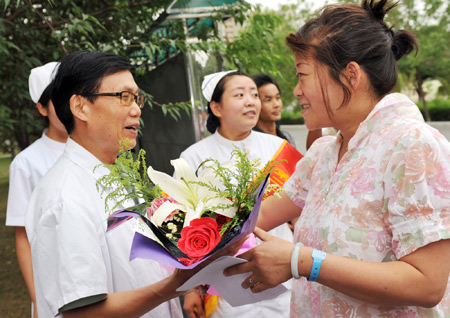 |
|
Yao Lumei (R), who was wounded in the July 5 riot, presents flowers to doctor Zhang Dekuan for his careful attendance before she leaves the hospital in Urumqi, capital of northwest China's Xinjiang Uygur Autonomous Region, July 15, 2009. Twelve of the twenty-two people who received treatment in the 23rd Hospital of the People's Liberation Army (PLA) after being wounded in the July 5 riot in Urumqi left the hospital on Wednesday as they recovered from the wounds. |
Almost two weeks after Xinjiang's deadliest riot in decades, most Urumqi residents feel secure again after tension has eased significantly in the city.
Now, for many in the autonomous region, another big step toward normality will come when the local government unblocks the Internet so they can go back online.
"No Internet in Xinjiang, no business for me," said Li Fenfa, an Urumqi resident who runs an online business selling dry fruit and who has seen no transactions for several days.
Online businesses have been among the hardest hit since authorities cut access to the Internet in most of the Xinjiang region following the July 5 riot that took the lives of almost 200 people.
Many online store owners have had to rely on friends in other parts of the country to post messages on their homepages telling potential buyers that business is on hold until after the Internet lockdown.
Professor Chen Lidan, a communications scholar at the Beijing-based Renmin University of China, said the government had blocked online access because that was the way instigators of the riots spread their messages and mobilized rioters.
Investigators believe overseas separatist groups used Internet tools including Tencent QQ and MSN, as well as social networking sites Twitter, Facebook and Xiaonei, to spread messages.
The Xinjiang government said it terminated Internet access to prevent the spread of the violence. Up to now, the only known public venue where the Internet could be found was the Hoi Tak Hotel, which was used as a base by reporters covering the riot's aftermath.
Some Web users have complained that their attempts to access Twitter and Facebook in other Chinese cities have also been unsuccessful. And Chinese portals, including Fanfou, which is similar to Twitter, have also been unavailable.
The government has not yet given a date when the services will be resumed.
"I believe most governments in the world will do something similar in times like these. But it is frustrating to know that I can't talk to my soccer club members after forum access was blocked," wrote John Ning, a self-proclaimed "Web freak" in Beijing.
Internet experts are now concerned that an extended "indistinctive Internet lockdown" may create new dilemmas for the government.
"The authorities probably think they are justified to cut off Internet on national security grounds, so they openly admitted it for the first time," said Hu Yong, a new media expert with the School of Journalism and Communication at Peking University.
But the lockdown has inevitably curtailed harmless Web activities, such as daily forums, information sharing and online shopping.
"Time after time, young Web users may grow doubts over the government's Internet policies, which will produce more profound impacts," Hu said.
China's young, whose daily lives often rotate around the Web, make up a large percentage of China's 300-million cyber population. They will "get discouraged" if they find their Internet space getting smaller, experts said while urging the government to use "wisdom of the masses" to deal with issues brought by new media.
"Blocking information should not be the first choice in an open society," said Yu Xiaofeng, director of non-traditional security and peaceful development studies at Zhejiang University. "The government should allow official and unofficial sources so that both the government and the public can seek truth through knowledge."
(China Daily July 16, 2009)